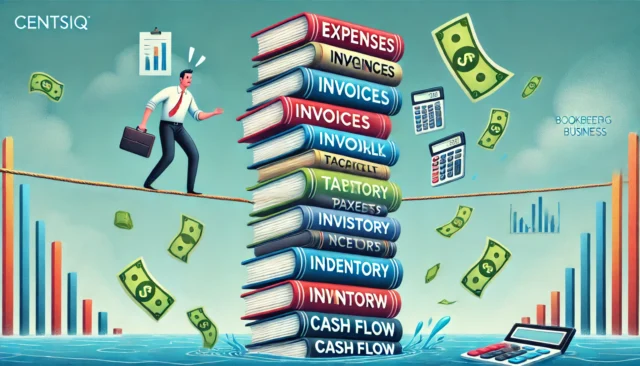
Keeping your finances in check is one of the most important aspects of being an independent contractor. Proper bookkeeping for contractors helps you stay organized, simplifies tax preparation, and enables better decision-making. Here’s everything you need to know to stay on top of your financial records and ensure your business thrives.
Table of Contents
- 1 Understanding Bookkeeping for Independent Contractors and Its Importance
- 2 How to Do Bookkeeping for Independent Contractors?
- 3 Key Bookkeeping Practices
- 4 Staying Organized with Financial Records
- 5 Navigating Taxes as a Contractor
- 6 Using Technology to Simplify Bookkeeping
- 7 Avoiding Common Pitfalls
- 8 Knowing When to Get Professional Support
Understanding Bookkeeping for Independent Contractors and Its Importance
Bookkeeping is the process of documenting and organizing your financial transactions, such as income and expenses. For independent contractors, maintaining accurate records is essential for tracking business performance and staying compliant with tax requirements.
Why Proper Bookkeeping Is Critical
- Ensures accurate and timely tax filings
- Supports informed financial planning and budgeting
- Simplifies loan or grant applications
- Provides a clear picture of your business’s health
How to Do Bookkeeping for Independent Contractors?
1. What accounting method do independent contractors use?
Independent contractors typically choose between two methods:
Independent contractors typically use one of two main accounting methods:
- Cash-basis accounting: This is the most common and straightforward method for independent contractors. With cash-basis accounting, you record income when you actually receive payment and expenses when you actually pay them. This method is simpler and often preferred by freelancers and small businesses because it:
- Provides a clear picture of how much cash you have on hand
- Aligns with how most people manage their personal finances
- Is easier to maintain without extensive accounting knowledge
- Accrual-basis accounting: Some independent contractors may opt for this method, especially as their business grows. With accrual-basis accounting, you record income when it’s earned (e.g., when you send an invoice) and expenses when they’re incurred, regardless of when money changes hands. This method:
- Provides a more accurate picture of your business’s financial health over time
- Is required for larger businesses and may be preferred by some clients
- Can be more complex to manage
Most independent contractors, especially those just starting out or with simpler business structures, tend to use cash-basis accounting due to its simplicity and ease of use. However, the choice between these methods can depend on factors such as:
- The size and complexity of your business
- Your clients’ preferences
- Your future growth plans
- Tax considerations
2. Select Tools That Fit Your Needs
Bookkeeping tools range from basic to advanced:
- Spreadsheets: Affordable and customizable using Excel or Google Sheets.
- Accounting Software: Programs like QuickBooks, FreshBooks, and Wave streamline tracking and reporting.
- Manual Records: While less common, some contractors prefer using paper systems for record-keeping.
Key Bookkeeping Practices
1. Record All Sources of Income
Document all revenue streams, such as:
- Payments from clients
- Royalties or commissions
- Interest earned on accounts
Organize income by type for easier analysis and reporting.
2. Track Expenses Carefully
Keeping tabs on expenses helps with tax deductions and financial planning. Common categories include:
- Office supplies
- Business-related travel
- Marketing and advertising
- Equipment and software
- Professional development
- Vehicle-related costs (if applicable)
Tip: Digitize receipts to prevent loss or damage over time.
3. Keep Business and Personal Finances Separate
To avoid confusion and maintain clean records, create a clear boundary between personal and business funds:
- Open a dedicated business bank account.
- Use a business credit card for professional purchases.
- Transfer a set amount to your personal account as your “salary.”
This practice simplifies bookkeeping and reduces errors.
Staying Organized with Financial Records
1. Create a Filing System That Works for You
Develop a system to store your financial documents efficiently:
- Use labeled folders (physical or digital) for organization.
- Sort by year and category (e.g., “Invoices 2024” or “Office Expenses 2024”).
2. Commit to Regular Updates
Update your records consistently to prevent backlogs and errors. Dedicate time weekly or monthly to:
- Record transactions
- Reconcile bank statements
- Check for unpaid invoices
- Review your cash flow
1. Plan for Quarterly Tax Payments
Independent contractors are responsible for paying taxes throughout the year. If you expect to owe $1,000 or more in taxes, the IRS requires quarterly estimated payments. Set aside a percentage of your income—typically 25–30%—to stay prepared.
2. Maximize Tax Deductions
Track all eligible deductions, which may include:
- Home office expenses
- Business travel costs
- Health insurance premiums
- Retirement contributions
- Professional development fees
Working with a tax professional can help ensure you claim all allowable deductions and avoid errors.
Using Technology to Simplify Bookkeeping
1. Explore Mobile Apps
Mobile apps can save time and effort:
- Receipt Scanning: Tools like Expensify or Dext make digitizing receipts easy.
- Mileage Tracking: Apps such as MileIQ monitor business-related travel automatically.
- Time Tracking: Apps like Toggl help accurately bill clients.
2. Adopt Cloud-Based Solutions
Cloud software offers flexibility and real-time access to your financial data. With programs like QuickBooks Online or Wave, you can:
- Send invoices on the go
- Access financial reports anytime
- Share data seamlessly with an accountant
Avoiding Common Pitfalls
- Mixing Business and Personal Finances: Always use separate accounts for a clear financial trail.
- Delaying Reconciliations: Regularly review your records to catch errors early.
- Overlooking Small Expenses: Even minor costs can add up and affect your profits.
- Waiting Until Tax Season: Staying organized year-round eliminates last-minute stress.
Knowing When to Get Professional Support
Managing bookkeeping on your own is possible, but there are times when professional assistance is worth considering. Seek help if:
- Your business is expanding rapidly.
- You spend too much time on bookkeeping tasks.
- Tax rules become too complex.
- You’re planning significant financial changes.
A qualified accountant or bookkeeper can save you time, improve accuracy, and provide valuable advice.
Keeping accurate financial records is a cornerstone of success for any independent contractor. By following these steps and adopting efficient practices, you’ll have the clarity and confidence needed to make informed decisions, stay compliant, and focus on growing your business.
Streamline your finances and focus on your work – let our bookkeeping services handle the numbers so you can grow your independent contracting business with confidence







